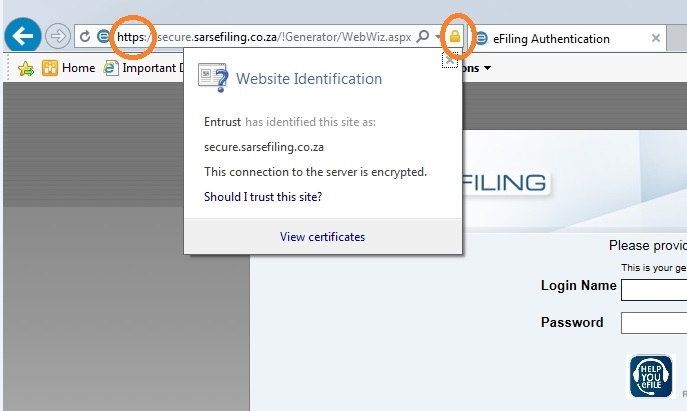1. SARS will never request your banking details in any communication that you receive via post, email, or SMS.
However, for the purpose of telephonic engagement and authentication purposes, SARS will verify your
personal details. Importantly, SARS will not send you any hyperlinks to other websites – even those of banks.
2. SARS will never ask for your credit card details.
3. SARS does not send *.htm or *.html attachments
4. Never give anyone your ID number or other personal information unless you initiated the contact or you are sure
you know who you are dealing with.
5. Protect your financial information. Ensure that your tax information, bank statements and other financial documents
are kept in a secure place.
6. Don’t respond to emails that provide you with a website link which requires you to log in and provide your
password details or update your personal information.
- Check the website URL. The website address usually starts with HTTP but with a secure connection the address should begin with HTTPS. The S stands for ‘Secure’.
- The lock icon is not just a picture. Click or double-click on it to see the details of the site’s security. This is important to know as some fraudulent websites are built with a bar at the bottom of the webpage to copy the lock icon of the browser. Therefore it is necessary to test the icon to make sure you can view the security information.

7. Keep secure personal information such as your ID Book, Passport and bank statements in your home. Shred all
financial and personal information before disposing of it.
8. Protect your personal computers by using firewalls, anti-spam/virus software and update security patches.
9. Change your passwords for Internet accounts on a monthly basis.
10. Tighten up on your social networking security settings. Criminals can make use of information obtained on
Facebook and other sites to steal your identity.
11. Check your credit record at least every 12 months to confirm that no unknown accounts or credit facilities have
been opened in your name.
12. Protect your information by registering with the South African Fraud Prevention Services if your ID or passport has
been stolen. This can be done at www.safps.org.za.
13. To report or to get more information on phishing, please send an email to phishing@sars.gov.za or call the Fraud
and Anti-Corruption Hotline on 0800 00 2870.
Top Tip: Stay informed by visiting the website regularly.


